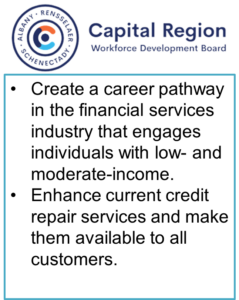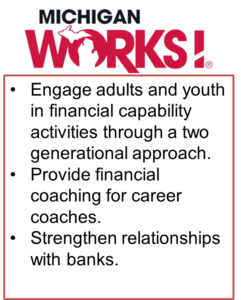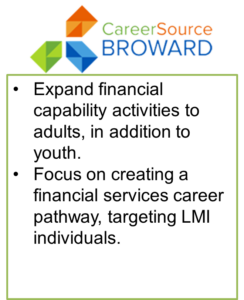CRA Pilots



In 2021, the LEAD Center initiated three pilots using the CRA as a starting point. These pilots, based in Albany, New York; Broward County, Florida; and Kalamazoo, Michigan, create partnerships with banks to develop financial education and financial industry career pathways services in the workforce system, focusing on LMI individuals from traditionally underserved communities. These pilots adopt best practices for Diversity, Equity, Inclusion, and Accessibility (DEIA) to connect diverse communities, including people with disabilities, to financial empowerment resources and career pathways with living wages.
These three pilots, highlighted below, successfully weave together a team of banks and financial institutions, organizations serving communities of color, and the workforce system (e.g., American Job Centers, Workforce Development Boards). While banks stand to gain CRA credits, individuals stand to gain skills support and new livelihood options. These pilots focus on the idea that banks can open doors to financial services careers in partnership with the workforce system their funding supports. The pilot leadership teams work with bank staff to structure customized career pathways for jobseekers in the community who are interested in working at local banks. For instance, career pathways are created for people to set their sights on an analyst position and steadily move up the career ladder from entry-level positions with less pay, benefits, and flexibility. Both banks and LMI individuals have benefited as a result.
Success Stories: New York, Florida, Michigan
The New York pilot in the Capital Region aimed to create a career pathway in the financial services industry. They engaged people from LMI communities and enhanced current credit repair services to make them available to all customers. Ultimately, the Capital Region developed a strong leadership team and expanded through partnerships with education leaders and connections with bank regulators. They established relationships with four banks/credit unions with whom they are developing customized career pathway/ladder models. They conducted resource mapping on financial capability services and began to shift leadership focus primarily to career pathways. They worked with CDICD and the United Way to hold a summit for banks and workforce system staff to discuss opportunities to partner around CRA credit.
The Florida pilot, CareerSource Broward, aimed to expand financial capability activities to adults and youth while also, creating a financial services career pathway to target individuals from LMI communities. CareerSource Broward successfully established financial capability training for jobseekers in the LMI community. They completed a map of financial capability services and resources in Broward County. They also developed a financial capability services desk aid for use by career service professionals and the people they serve. To ensure continued success, they created relationships with Florida-based regulators from Federal Deposit Insurance Corporation (FDIC) and the Office of the Comptroller of the Currency (OCC) to provide leadership strategies with CareerSource Broward’s outreach to banks and continued support with future interactions with banks.
The Michigan pilot, MichiganWorks! Southwest, aimed to engage adults and youth in financial capability activities through a two-generational approach; provide financial coaching for career coaches; and strengthen relationships with banks. They also organized and hosted a financial wellness panel across four counties.
Though there were many successes and lessons learned so far, these pilots are only the beginning. In the future, the LEAD Center plans to host high-level meetings between the U.S. Department of Labor and federal level bank regulators (FDIC, OCC, and Federal Reserve Board) to encourage promotion of workforce-bank collaboration and intersectional disability inclusion nationally. Through the CRA pilot, the LEAD Center team learned banks and local workforce boards share an interest in supporting living-wage jobs and career opportunities for LMI individuals, including people with disabilities. The LEAD Center will apply the learnings to launch a second phase of the CRA pilot to scale efforts to further support inclusive career pathways in the financial services industry.
